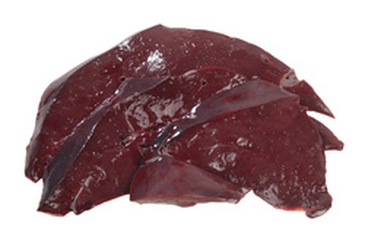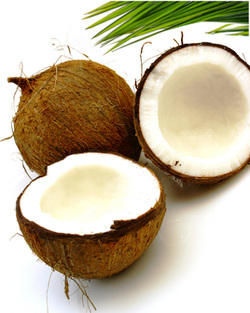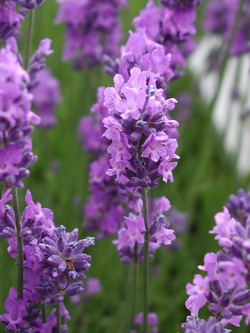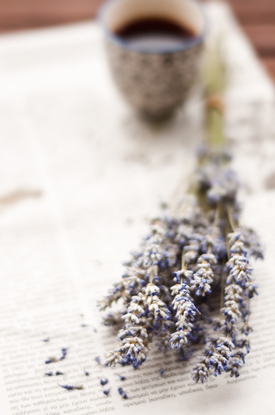 Health Benefits of Liver Meat I am almost positive you don't start salivating at the mentioning of the word "liver". But wait, maybe you haven't really had a good liver dish, or perhaps you haven't heard of the amazing health benefits of it. I happen to love liver. I understand it really has to do with my Eastern European upbringing, where liver is a big part of Slavic cuisine. I liked it, I ate it, but never really knew of its properties. Since starting my new paleo way of life, I've learned of all the great health benefits liver provides. Yes, it might look weird, and smell funny, but don't discard it just because of that. In fact, did you know that in some cultures, the organ meats were uniquely preferred over the lean muscle meats, which perhaps were given to the dogs.
Liver is an excellent source of high quality protein, folic acid and iron; contains an abundance of vitamin A, which is crucial for the creation of cells in your eyes, and several B vitamins. Consuming foods rich in iron are beneficial for people who suffer from iron deficiency anemia. Beef liver contains more than 500 percent of the recommended daily intake of Vitamin A and chicken livers have more than 300 percent. Liver is the number one food source of copper; and contains CoQ10, which is important for cardiovascular function. A slice of beef liver contains about 338 mg of phosphorus which your body needs for functions such as the building of bones and teeth and proper waste processing by the kidneys. These nutrients provide the body with certain abilities to get rid of toxins.
Make sure you consume meat and organ meats from animals that have been raised in fresh pastures without hormones or antibiotics. I've been buying my liver at Whole Foods. It's already all prepped and ready to go. The best part about it - IT IS CHEAP. Less than $3 a pound. Not bad! So if you've never really tried liver before, don't be afraid to give it a try. Make sure not to overcook liver to avoid tough meat. Just remember how good it is for you!
 If you feel discouraged and want to give up on organic food just because you've heard kind of negative reviews about organic food in the news lately, you are not alone! The media has been reporting that organic food is no more nutritious than conventional foods. Thus, there is no need to buy organic food. My first reaction to the study was sheer disbelief and disappointment that I was spending more money on organic when I could have just gone mainstream. After rationally weighing the information in my mind, I came to the conclusion that something must of gone wrong with the study. It did sound fishy! How could such important information be based on just one university study and no long term data comparison between two? After some investigation, I discovered that the Standford organic study was a fraud because there was no real study done. The researches at the University basically collected 200 peer-reviewed studies that examined differences between organic and conventional food, or the people who eat it. Nothing was planted, and nothing was compared properly. It was really a review of prior published studies, and who knows if those studies handled crops correctly.
Take a look at the key differences between conventional farming and organic farming:
Conventional
Apply chemical fertilizers to promote plant growth.
Spray synthetic insecticides to reduce pests and disease.
Use synthetic herbicides to manage weeds.
Give animals antibiotics, growth hormones and medications to prevent disease and spur growth.
Organic
Apply natural fertilizers, such as manure or compost, to feed soil and plants.
Spray pesticides from natural sources; use beneficial insects and birds, mating disruption or traps to reduce pests and disease.
Use environmentally-generated plant-killing compounds; rotate crops, till, hand weed or mulch to manage weeds.
Give animals organic feed and allow them access to the outdoors. Use preventive measures — such as rotational grazing, a balanced diet and clean housing — to help minimize disease. I don't know about you, but after comparing side by side the differences in farming, I can logically deduce that Organic is better for you since food produced organically contains fewer contaminants. Some scientific studies did show that there are more nutrients in organically produced food. An American study found that organically grown food contained much higher than average levels of minerals than non-organic food. A comprehensive review of 97 published studies comparing the nutritional quality of organic and conventional foods shows that organic plant-based foods (fruits, vegetables, grains) contain higher levels of eight of 11 nutrients studied, including significantly greater concentrations of the health-promoting polyphenols and antioxidants. Also, organic fruits and vegetables had significantly higher levels of cancer-fighting antioxidants, according to a 2003 study in Journal of Agricultural and Food Chemistry. A U.S. research team from Emory University in Atlanta analyzed urine samples from children ages three to 11 who ate only organic foods and found that they contained virtually no metabolites of two common pesticides, malathion and chlorpyrifos. However, once the children returned to eating conventionally grown foods, concentrations of these pesticide metabolites quickly climbed as high as 263 parts per billion, says the study. In conclusion, I think there is plenty of evidence to support Organic Farming! We can't become victims of the mainstream media!
 We can all agree that when it comes to our kids, we want the very best for them. According to our knowledge, wisdom, and the facts we know, as parents we try to raise our kids well. Since I've strayed away from mainstream nutritional wisdom, conventional baby food will not work for me. When it comes to my baby, I dig deep into research. I refuse to be a blind parent being led by deceiving facts or marketing gimmicks. So first of all, forget what all the big cereal companies are feeding you and your baby! Why?
There are a few important reasons for that:
- Popular rice products, including, rice cereal, contain arsenic, a potent carcinogen that can cause damage to a child’s developing brain. According to a study done by Consumer Reports Magazine, "Worrisome arsenic levels were detected in infant cereals, typically consumed between 4 and 12 months of age." The really disturbing part about this, is the notion that these baby foods are being labeled as "health foods".
- Babies stomachs cannot properly break down grains. In order for grains to be broken down properly, our bodies have to have adequate amounts of the proper enzyme, called amylase; and babies just don't have enough of these. Until molar teeth are fully developed, it can take up to 28 months for the arbohydrate enzymes (amylase) to fully start working.Thus, feeding rice cereal can cause inflammation due to improper digestion and later can contribute to allergies and the formation of auto-antibodies associated with diabetes.
- Baby cereals are often fortified with a list of supplemental vitamins and minerals including iron which can lead to serious health problems. The American Academy of Pediatricians makes recommendations that parents buy iron-fortified baby food, and especially be given to breastfed babies. The mainstream wisdom declares that iron deficiency leads to many health problems thus giving some extra to your baby will not do any harm. However, recent research showed that iron fortified foods promote the growth of intestinal pathogens and alter intestinal and systemic immune function. Additionally, another study on the effects of iron on the crucial skeletal developments in early life shows “iron supplementation in young children without iron deficiency may jeopardize optimal height and weight gains.”
Extensive research has proven the dangers of feeding cereal to your baby, so the choice is yours. Remember, there are much better alternatives for your baby than a box of cereal.
 Since it's been all about coconut for me lately, I've decided to maximize and expand my coconut oil horizons. It's actually a win win situation for me because it's a cost saving multi purpose tasker in one jar. And since I love the smell of coconut, it's usage on my skin is also very pleasant. And did you know that Lauric acid is a major component (49%) of Coconut oil which gives it antimicrobial, antifungal, and antibacterial properties? It also has some antioxidant properties. So here are some ways that I've used coconut oil:- I guess the number one way of using coconut oil for me is adding it in my daily smoothies. Since virgin coconut oil can be used as a natural medicine to fight a cold, flu or viral fever, I use it daily as a preventive measure to strengthen my immune system, or if i feel like I am coming down with something, I take 2-3 tablespoons along with meals. I has definitely been working for me; I haven't really been sick in 2 years now.
- Due to it's high smoke point, cooking with coconut oil is safe at high temperatures. I've substituted coconut oil in a lot of my cooking especially a lot of the breakfast dishes since it gives that a somewhat sweet coconut aftertaste. I also like using it in my roasted dishes (especially with sweet potatoes).
- You can also massage coconut oil into your body which can help in fighting the common cold or flu.
- Shaving my legs. It gives a lot of moisture to my skin. My skin feels really smooth and shiny afterwards.
- Taking my eye makeup off. It is incredibly useful for me since I use waterproof eyeliner. It removes my eye makeup easily without any damage to my skin; I don't have to rub it in too hard like with other products.
- I use coconut oil on my knees and elbows. These are the areas of dry skin, and I've honestly seen the improvement. It doesn't look as flaky and dry.
- Using it as a deep conditioning hair treatment. According to several studies, coconut oil is better able to penetrate the hair than mineral oil. You can do this natural hair mask once a week or couple of times a week, just make sure you rinse it off really good. It took me couple of practice tries to nail down the method. The first time I applied coconut oil to my hair, I didn't rinse it off well enough. So, after blow drying my hair it looked like I used a whole bottle of gel on my hair, or like I hadn't washed my hair in months. You can also leave the treatment overnight for better results.
- Using it as a facial moisturizer. It has really worked for me, but I don't think it would be helpful for people with oily skin.
So as you see there are many ways to utilize coconut oil without spending a lot of money.
 Lavender is an herb that has been used for centuries and offers a plethora of health benefits. Originally grown in the Mediterranean, lavender flowers and oil are widely used. Dried lavender flowers are used in many natural remedies which proved to have antiseptic, producing calming and relaxing effects. English Lavender is the most common strain of the lavender family which is used in herbal medicine. Because of the tannin, mineral substances, and essential oils, lavender flowers have antiseptic, nerve stimulating, and calming effects. Essential oils derived from a lavender plant serve as a wonderful medicine. Lavender essential oils are used in cosmetology, perfumery and many other areas. The healing properties of oils can help treat bruises and burns; lavender stems and leaves are also used in aromatherapy. In addition, lavender contains the so-called honey, which is an excellent remedy. Lavender is also used in commercial fragrances and lavender scent is traditionally used in sachets and potpourri. Lavender flowers serve as an insect repellent to protect clothes. Lavender is used as a treatment for the following conditions: Lavender helps in inducing sleep due to its sedative properties. You can also use it to sooth babies. In order to induce sleep, keep lavender flowers next to your pillow. You can also inhale the scent of lavender by applying its oil to clothes. You can infuse lavender into a tea which serves as a great relief for headaches. The lavender herb helps to get rid of headaches and nausea due to its soothing scent. The calming properties of lavender oil on the senses help relieve depression and anxiety. It can also reduce muscular pains.... To ease muscular pain, add a few drops of Lavender oil into bath water. - Digestion Problems/Abdominal Pain
The lavender herb may also help in reducing excessive bloating and gas. The Lavender herb is beneficial in treating rheumatism and arthritis because it tends to relax muscles and ease pain. The Lavender herb helps in treating asthma, coughs, and colds. By clearing the respiratory pathway, it helps with breathing. Due to the antibacterial properties of lavender, it can be used in the treatment of skin ailments such as acne, eczema, infections, psoriasis, and burns. It can be applied to cuts and scrapes in which case it helps speed up the formation of new tissue. Lavender has been used for other conditions such as: joint inflammation, fainting, neuralgia, vertigo,heart palpitations, epilepsy, sprains, flatulence, colic, vomiting, toothache, snakebites, loss of voice, abscess, alopecia, athletes foot, insect bites, boils, allergies, sunburn, cystitis, earache.
Thus, lavender possesses many healing properties and can be used for relaxation to relieve stress and insomnia. In addition, the inhalations of lavender infusions will help to consolidate and protect your organism! You will be less susceptible to infections and fatigue. Additionally, both fresh and dried lavender can be used in cooking which adds a beautiful color and a savory flavor to many dishes.
|







